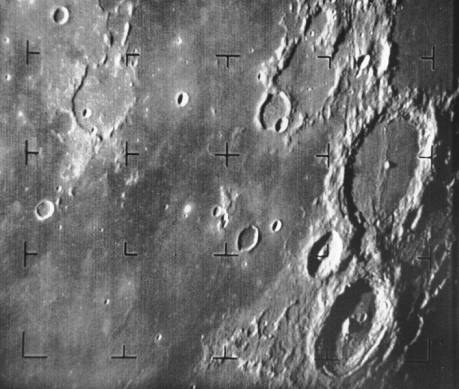
|
Credit & Copyright: NASA
Explanation:
On July 31, 1964,
Ranger 7 crashed into the Moon.
Seventeen minutes
before impact it snapped this picture -
the first image of the Moon ever taken by a U.S. spacecraft.
Of course Ranger 7 was intended to crash,
transmitting close-up pictures of the lunar surface
during its final moments.
The Ranger program's goal was to begin high resolution mapping of the
lunar surface in preparation for a future
lunar landing.
This first image covered 360 kilometers from top to bottom and
is centered in the
Mare Nubium (Sea of Clouds).
The large crater at middle right,
Alphonsus,
is 108 kilometers in diameter.
On July 31, 1999, Lunar Prospector crashed into the Moon. During its successful 1 year mission to map the Moon's global properties from orbit, Lunar Prospector confirmed indications that water-ice could be trapped in permanently shadowed craters near the lunar poles. Its mission complete, controllers intentionally targeted the spacecraft to impact a crater wall, hoping that water could be more directly detected in the resulting debris cloud - although the chances of a successful detection were considered low. Astronomers analyzing the data recently announced that no visible signature of water was found, so the tantalizing case for water on the Moon remains open.
|
January February March April May June July August September October November December |
| ||||||||||||||||||||||||||||||||||||||||||||||||
NASA Web Site Statements, Warnings, and Disclaimers
NASA Official: Jay Norris. Specific rights apply.
A service of: LHEA at NASA / GSFC
& Michigan Tech. U.
Based on Astronomy Picture
Of the Day
Publications with keywords: Moon - water - Ranger 7 - lunar prospector - Ranger program
Publications with words: Moon - water - Ranger 7 - lunar prospector - Ranger program
See also:
